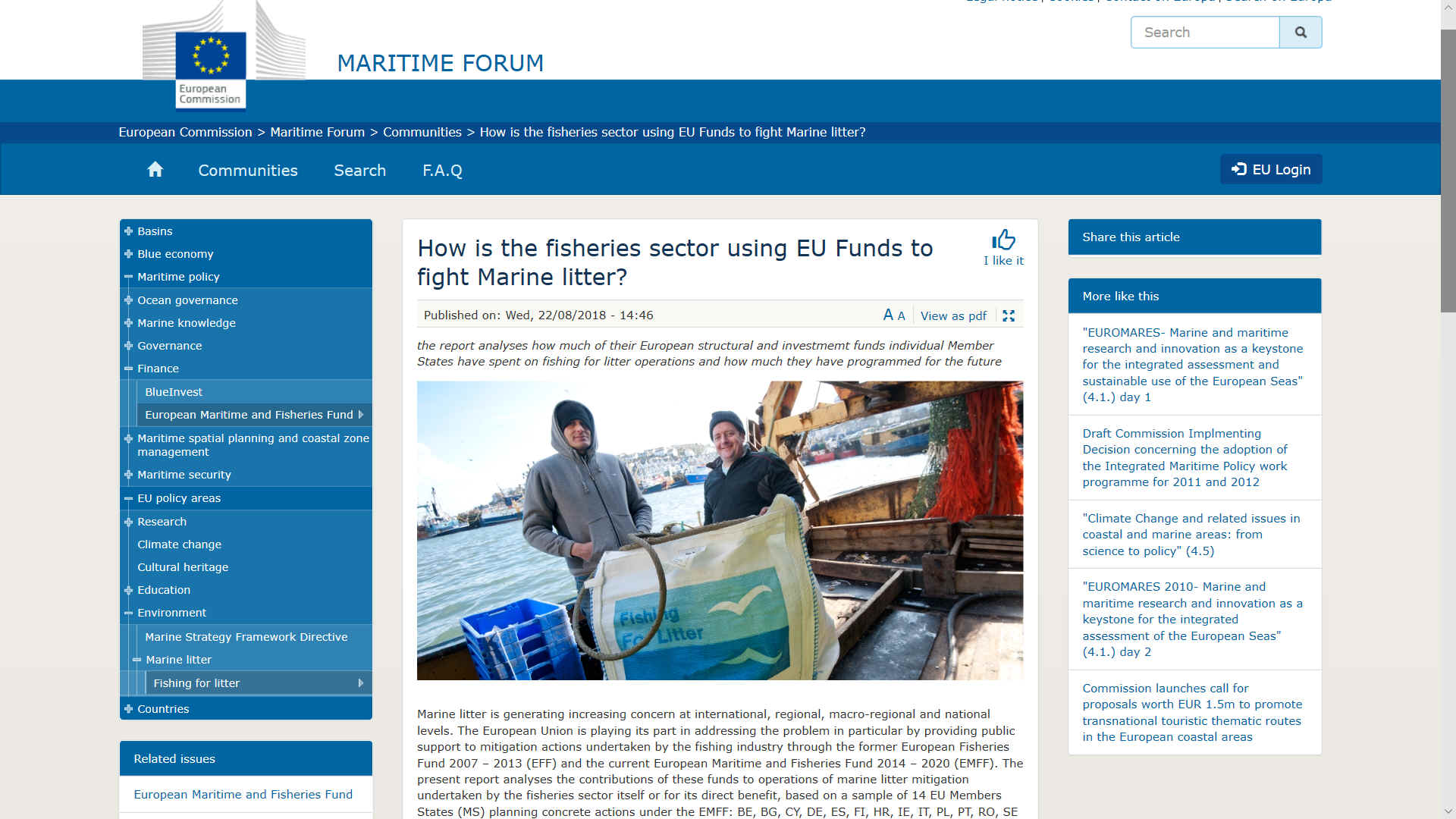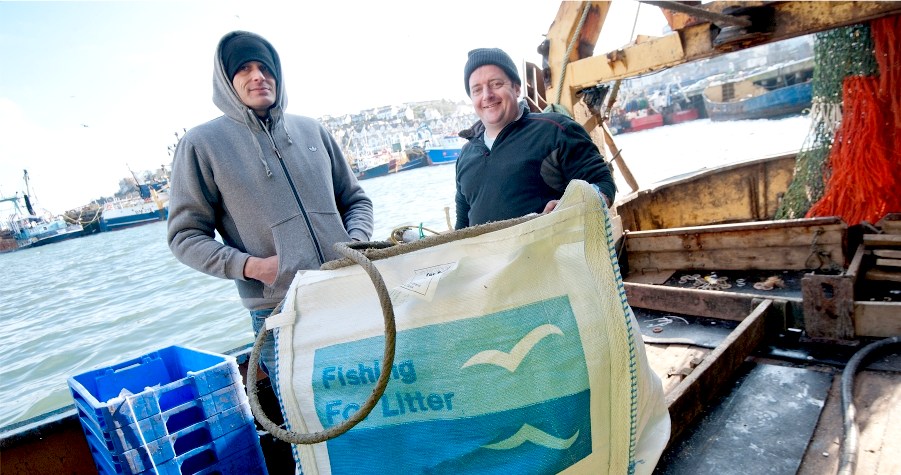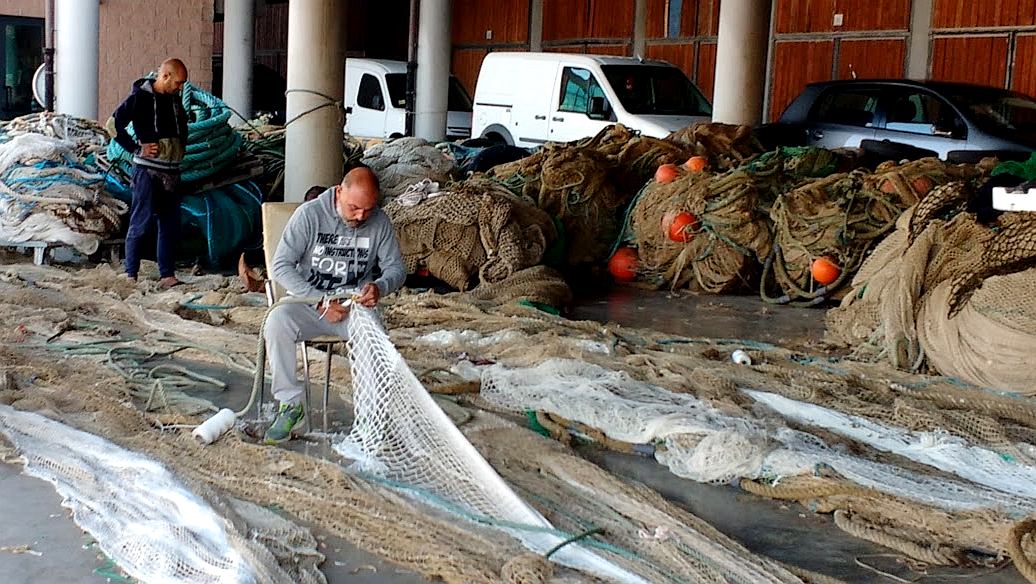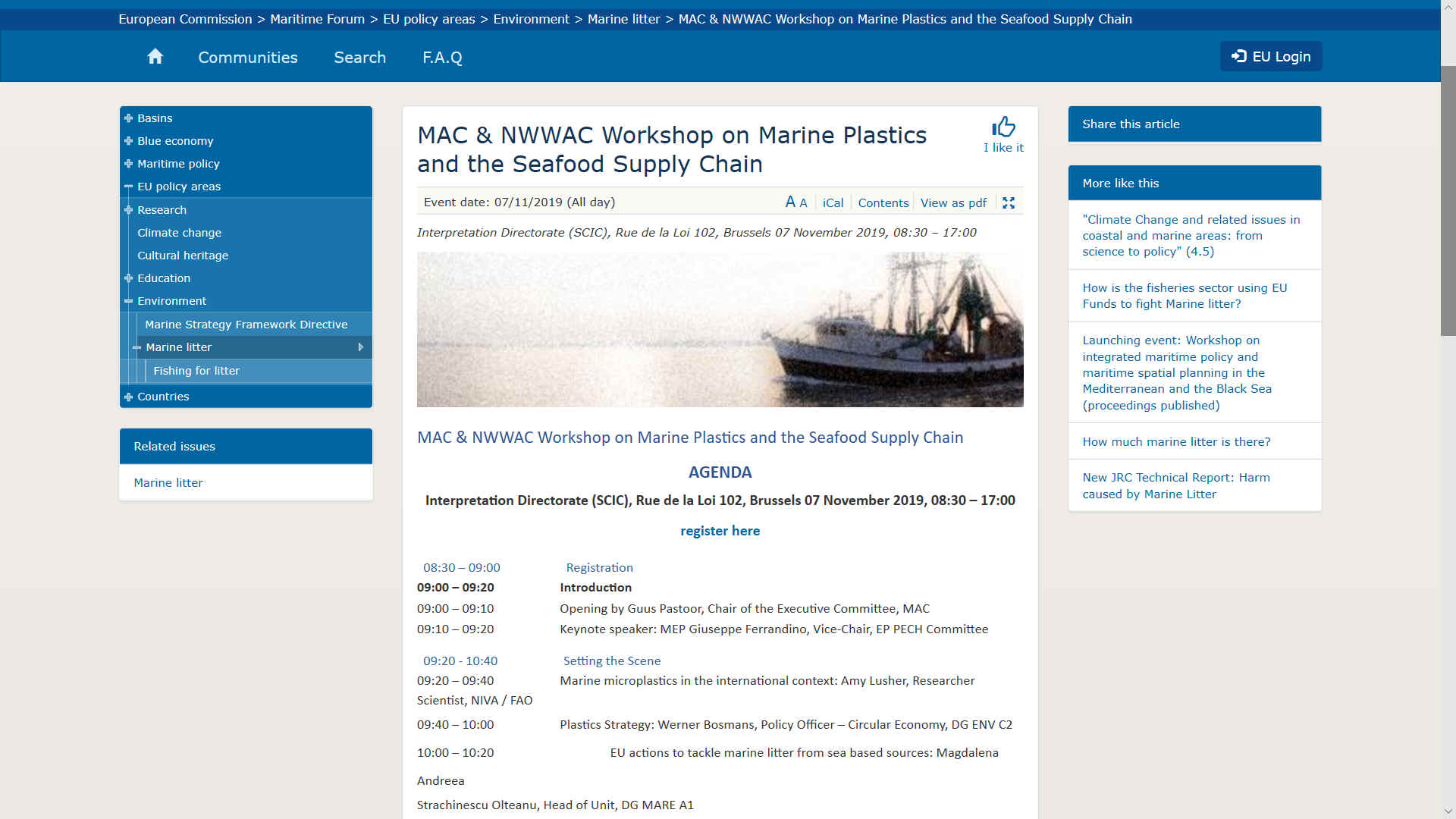|
EMFF - EUROPEAN MARITIME & FISHERIES FUND
PLEASE USE OUR A-Z INDEX TO NAVIGATE THIS SITE
ARE THE EMFF'S POLICIES WORKING? - If they were, we'd not have plastic poisoning the marine environment. Policies need to be flexible and proactive if they are going to stand any chance of succeeding.
The Commission has adopted a number of proposals for appropriate collection and treatment of fishing gear and fragments of fishing gear once it is damaged beyond repair. Based on these proposals, Council and Parliament are close to signing them into EU law.
22 AUGUST 2018 - How is the fisheries sector using EU Funds to fight Marine litter?
Under the EMFF, the number of MS planning actions for the collection of ALDFG and marine litter by fishers (EMFF Article 40.1(a)) increased to 14 (BE, BG, CY, DE, ES, FI, HR, IE, IT, PL, PT, RO, SE and UK have all committed resources in their respective Operational Programmes (OPs). The target number of operations in the OPs is 108 with planned public and EMFF contributions around EUR 31 and 22 million respectively. In terms of total public or EMFF contributions, "fishing for litter" actions represent only 2% of all measures foreseen under the various measures in support of the EU fishing fleet. Up until the end of 2016 only four MS had started to implement "fishing for litter" activities, with 12 operations selected (representing 11% of the planned number of operations and 2% of the targeted EMFF financial support for the programming period). Taking into account activities planned for the near future (even if not yet selected), the number of operations rises to 29 (27% of the target) in eight MS.
At this stage, no operations for the investment in facilities for marine litter collection in ports were identified under EMFF Art. 43.1. However, other initiatives by the fishing sector may have been implemented under other measures in particular under Community-Led Local Development. All the above EMFF estimates should thus be considered as conservative.
In addition to measures for the collection of marine litter by the fishing sector, other initiatives not involving that sector may be implemented under the Community-Led Local Development (CLLD, UP4) and the Integrated Maritime Policy (Art. 80.1.b and c), are potentially relevant to marine litter mitigation . For example, five IMP operations (all in NL) with EUR 1.5 million of EMFF contributions focus on research, monitoring and awareness raising activities.
Actions for the mitigation of marine litter under EFF and EMFF play only a minor role both in terms of the total number of EFF/EMFF operations and the budgets committed, and EMFF implementation progress has been slow as for the rest of EMFF operations. Nevertheless, the EFF, and now the EMFF, offer possibilities through different measures to involve the fishing industry in addressing the marine litter problem, be it the retrieval of ALDFG, the provision of facilities and equipment for marine litter collection, research studies, or awareness raising activities.
In conclusion, although interest by MS in utilising EU funding support to involve the fishing industry in the reduction of marine litter has drastically increased from the EFF to the EMFF programming period, indicators are lacking to evaluate the effectiveness and efficiency of the marine litter-related actions undertaken by the fishing industry itself or of direct benefit to that industry. Monitoring and evaluating such indicators would contribute to identifying the best approaches for the involvement of the fishing industry in the reduction of marine litter in general, and of litter emanating from the fishing and aquaculture industry in particular.
27 FEBRUARY 2019
- Moving forward on EU measures for proper waste management of fishing gear
Without prejudice to technical measures laid down in Council Regulation (EC) No 850/98 the Commission shall request the European standardisation organisations to develop harmonised standards relating to the circular design of fishing gear to encourage preparation for re-use and facilitate recyclability at end of life.
The standard for the fishing gear may be used for the fee modulation under EPR schemes, to define criteria/characteristics that enable recycling of fishing gear. It is still a question how prescriptive the criteria could be defined, but it could be possible to define general criteria for the recyclability of different kinds of fishing gears, including looking at elements that hamper the recycling process. Normally the process of requesting and delivering a standard takes 2-3 years.
Sufficient Input of good quality input is the main challenge for both recycling plants
EU Certplast certification of the recycling plants increases traceability options and better reporting on process losses (gross input versus net output)
RETRAWL - Recycling of plastic and metal from trawl and net (EU Eco-innovation initiative funding)
Definitions in WFD and Circular Economy Package should be the basis of EPR principles, respecting the Waste Hierarchy. There should be a single EPR scheme for entire Europe, (volumes entering the market are << 1% of the total yearly plastic consumption in Europe, only some 300 stakeholders mainly small SMEs and some 10 producers of ropes and netting).
logistics is more of a challenge than the material processing. Separate collection is a must with focus on quality sorting. There is need for better data on plastic waste collected by types (e.g. by types of fishing gear). The M.O.R.E. data base (in preparation) will allow plastics converters to report on the use of recycled plastics in their products next to prevention and re use, recycling should be put as priority option. Landfill should be prohibited in all EU, incineration (and cement kilns etc) should be discouraged and only be an option when recycling can technically not be done at certified recycling plants. Such products should then be re-designed or pay a considerably higher EPR fee.
Mixed plastic products often make use of the recycled raw material in the same application difficult or impossible. Alternative market outlets often then with low added value, or non-existing. Re-design of ropes needs to be addressed in more detail, as some material mixtures are complex and can only go to incineration or landfill. Mechanical recycling of fishing gear is about 40% more environment friendly than chemical recycling. The latter is close to conventional plastic production. For some applications chemical recycling however is a better option.
If industry is involved from the beginning, it could help e.g. with voluntary commitments
Marking of gear : Is already mandatory according to Europeche in some countries, other ways of reporting may however prove to be more effective Other business concepts (like leasing) are being looked at presentation from Eurocord presentation from waste free oceans.
The Commission services pointed out that:
* They are free to work together but in other domains this has not happened
* the proposed Directive stipulates separate collection of fisheries waste
* monitoring what is put on the market and what is collected are obligations under extended producer responsibility
Via webex:
Ewa Milevska and Krzysztof Stanuch Baltic Sea AC
LINKS & REFERENCE
https://webgate.ec.europa.eu/maritimeforum/en/node/4442 https://webgate.ec.europa.eu/maritimeforum/en/node/4296 https://webgate.ec.europa.eu/maritimeforum/en/node/4200
ARE PLANET EARTH'S POLICIES WORKING? - If they were, we'd not have plastic poisoning the marine environment, or global warming. The problem is world leaders rely too much on fossil fuels and do not want to rock the boat until there is a solid backup plan, but the backup plan involves implementing change. And that frightens politicians into staying put even though the water is already toxic.
We cotton to that. Nobody likes change, they want an easy life. But instead of poisoning and killing life undersea with toxic plastic, surely it would make sense to brave the new world and accelerate the adoption of renewables and a society that cleans up after itself sustainable. We need new sustainable policies to save OCEAN A that sits well with stakeholders. Not to have a plan or two in the pipeline is suicide politics - the way of the Dodo - because there is no OCEAN B.
PLEASE USE OUR A-Z INDEX TO NAVIGATE THIS SITE
This website is provided on a free basis as a public information service. copyright © Cleaner Oceans Foundation Ltd (COFL) (Company No: 4674774) 2019. Solar Studios, BN271RF, United Kingdom. COFL is a company without share capital.
|



